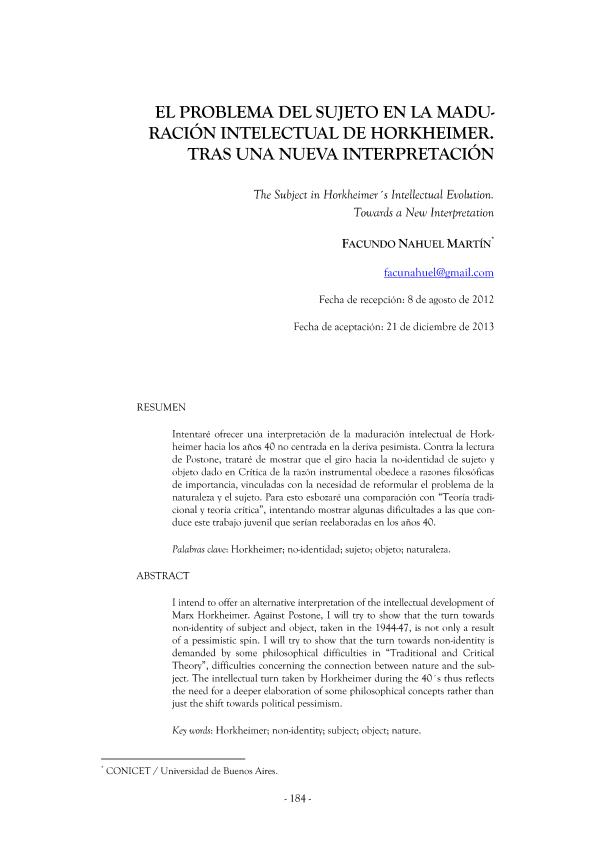Artículo
Intentaré ofrecer una interpretación de la maduración intelectual de Horkheimer hacia los años 40 no centrada en la deriva pesimista. Contra la lectura de Postone, trataré de mostrar que el giro hacia la no-identidad de sujeto y objeto dado en Crítica de la razón instrumental obedece a razones filosóficas de importancia, vinculadas con la necesidad de reformular el problema de la naturaleza y el sujeto. Para esto esbozaré una comparación con “Teoría tradicional y teoría crítica”, intentando mostrar algunas dificultades a las que conduce este trabajo juvenil que serían reelaboradas en los años 40. I intend to offer an alternative interpretation of the intellectual development of Marx Horkheimer. Against Postone, I will try to show that the turn towards non-identity of subject and object, taken in the 1944-47, is not only a result of a pessimistic spin. I will try to show that the turn towards non-identity is demanded by some philosophical difficulties in “Traditional and Critical Theory”, difficulties concerning the connection between nature and the subject. The intellectual turn taken by Horkheimer during the 40´s thus reflects the need for a deeper elaboration of some philosophical concepts rather than just the shift towards political pessimism.
El problema del sujeto en la maduración intelectual de Horkheimer: tras una nueva interpretación
Título:
The Subject in Horkheimer´s Intellectual Evolution. Towards a New Interpretation
Fecha de publicación:
12/2013
Editorial:
Sociedad de Estudios de Teoría Crítica
Revista:
Constelaciones
e-ISSN:
2172-9506
Idioma:
Español
Tipo de recurso:
Artículo publicado
Clasificación temática:
Resumen
Palabras clave:
Horkheimer
,
No-Identidad
,
Sujeto
,
Naturaleza
Archivos asociados
Licencia
Identificadores
Colecciones
Articulos(SEDE CENTRAL)
Articulos de SEDE CENTRAL
Articulos de SEDE CENTRAL
Citación
Martín, Facundo Nahuel; El problema del sujeto en la maduración intelectual de Horkheimer: tras una nueva interpretación; Sociedad de Estudios de Teoría Crítica; Constelaciones; 5; 12-2013; 184-204
Compartir




